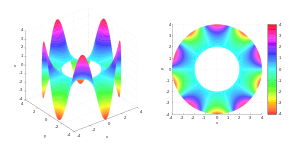This article includes a list of references, related reading, or external links, but its sources remain unclear because it lacks inline citations. (September 2024) |

In the theory of partial differential equations, elliptic operators are differential operators that generalize the Laplace operator. They are defined by the condition that the coefficients of the highest-order derivatives be positive, which implies the key property that the principal symbol is invertible, or equivalently that there are no real characteristic directions.
Elliptic operators are typical of potential theory, and they appear frequently in electrostatics and continuum mechanics. Elliptic regularity implies that their solutions tend to be smooth functions (if the coefficients in the operator are smooth). Steady-state solutions to hyperbolic and parabolic equations generally solve elliptic equations.